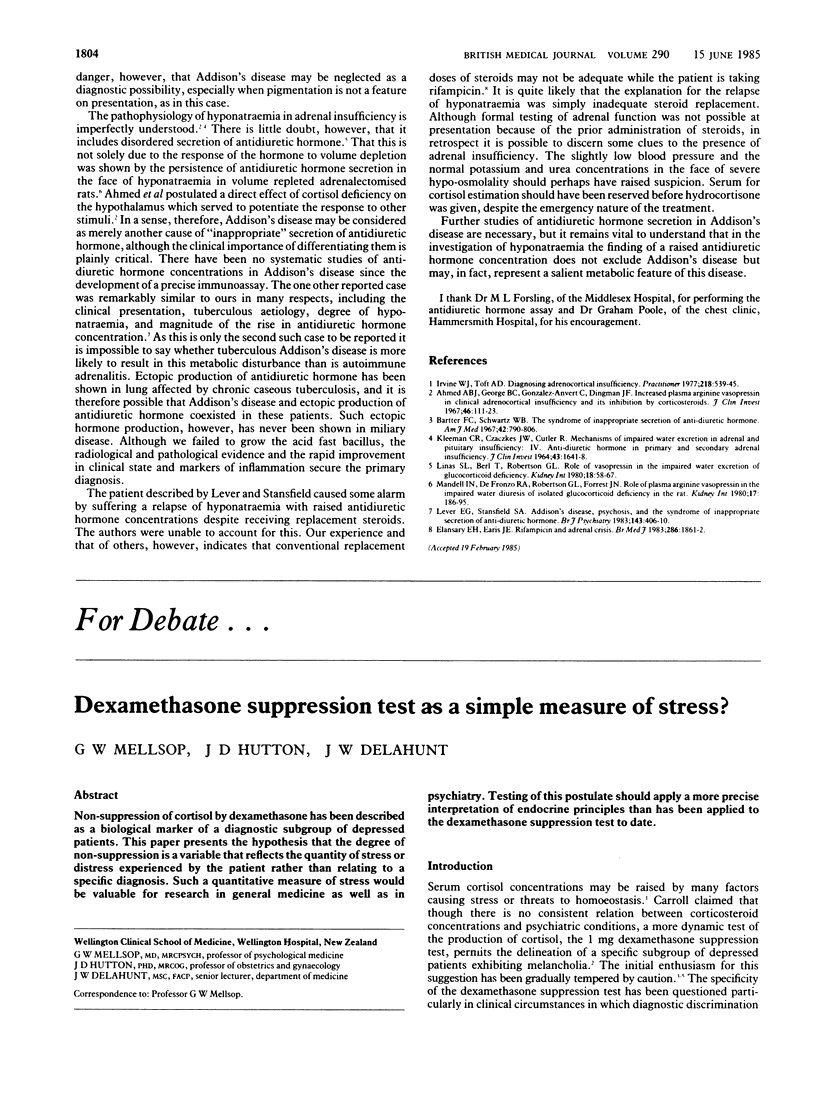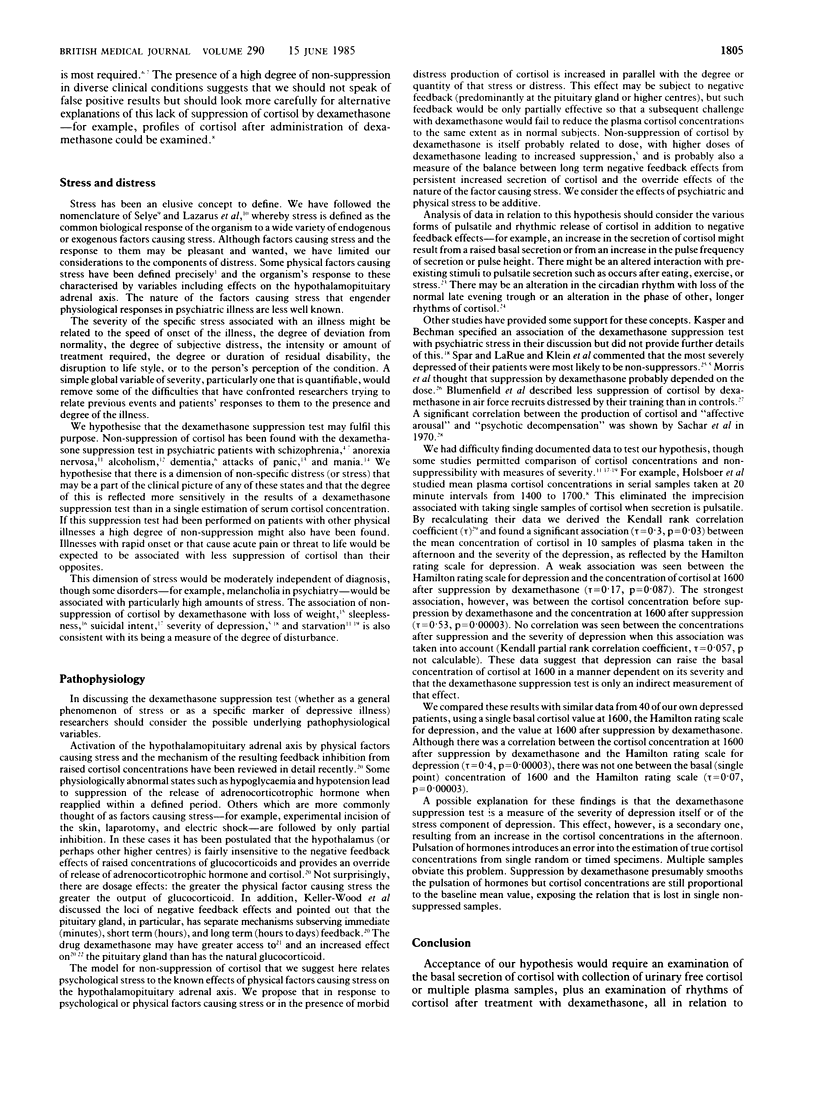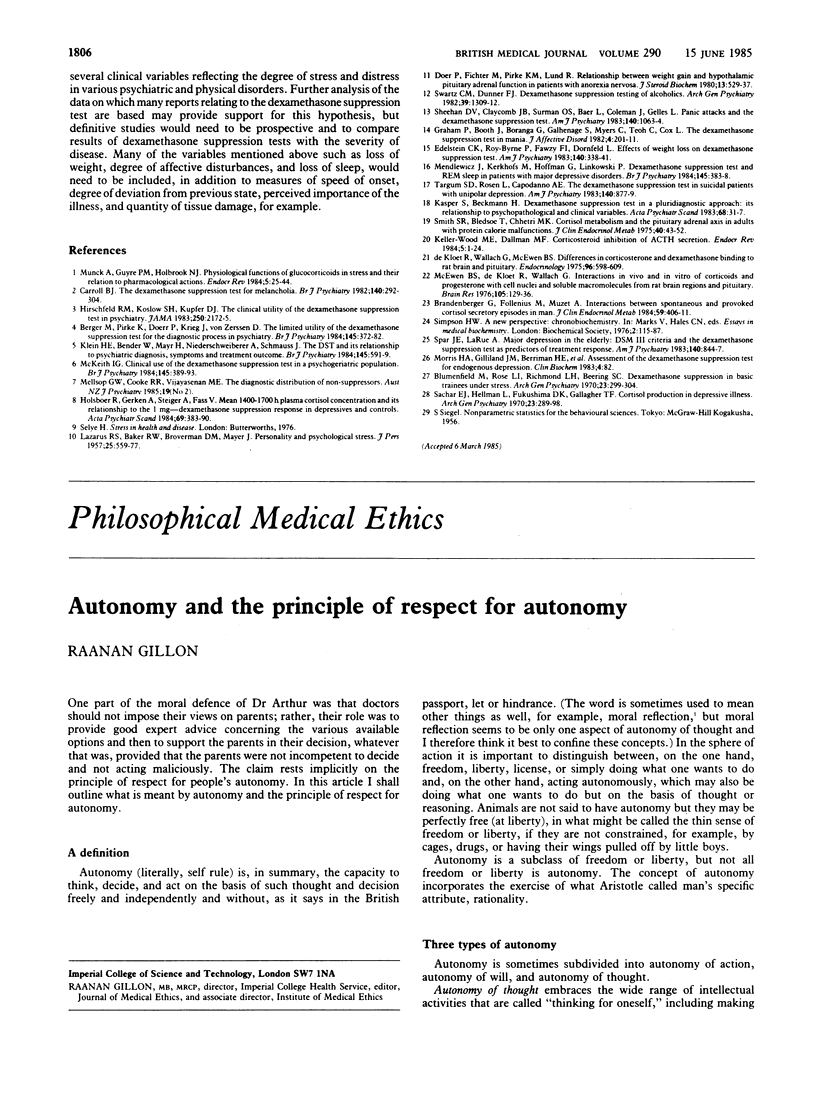Abstract
Non-suppression of cortisol by dexamethasone has been described as a biological marker of a diagnostic subgroup of depressed patients. This paper presents the hypothesis that the degree of non-suppression is a variable that reflects the quantity of stress or distress experienced by the patient rather than relating to a specific diagnosis. Such a quantitative measure of stress would be valuable for research in general medicine as well as in psychiatry. Testing of this postulate should apply a more precise interpretation of endocrine principles than has been applied to the dexamethasone suppression test to date.
Full text
PDF


Selected References
These references are in PubMed. This may not be the complete list of references from this article.
- Berger M., Pirke K. M., Doerr P., Krieg J. C., von Zerssen D. The limited utility of the dexamethasone suppression test for the diagnostic process in psychiatry. Br J Psychiatry. 1984 Oct;145:372–382. doi: 10.1192/bjp.145.4.372. [DOI] [PubMed] [Google Scholar]
- Blumenfield M., Rose L. I., Richmond L. H., Beering S. C. Dexamethasone suppression in basic trainees under stress. Arch Gen Psychiatry. 1970 Oct;23(4):299–304. doi: 10.1001/archpsyc.1970.01750040011002. [DOI] [PubMed] [Google Scholar]
- Brandenberger G., Follénius M., Muzet A. Interactions between spontaneous and provoked cortisol secretory episodes in man. J Clin Endocrinol Metab. 1984 Sep;59(3):406–411. doi: 10.1210/jcem-59-3-406. [DOI] [PubMed] [Google Scholar]
- Carroll B. J. The dexamethasone suppression test for melancholia. Br J Psychiatry. 1982 Mar;140:292–304. doi: 10.1192/bjp.140.3.292. [DOI] [PubMed] [Google Scholar]
- De Kloet R., Wallach G., McEwen B. S. Differences in corticosterone and dexamethasone binding to rat brain and pituitary. Endocrinology. 1975 Mar;96(3):598–609. doi: 10.1210/endo-96-3-598. [DOI] [PubMed] [Google Scholar]
- Doerr P., Fichter M., Pirke K. M., Lund R. Relationship between weight gain and hypothalamic pituitary adrenal function in patients with anorexia nervosa. J Steroid Biochem. 1980 May;13(5):529–537. doi: 10.1016/0022-4731(80)90209-5. [DOI] [PubMed] [Google Scholar]
- Edelstein C. K., Roy-Byrne P., Fawzy F. I., Dornfeld L. Effects of weight loss on the dexamethasone suppression test. Am J Psychiatry. 1983 Mar;140(3):338–341. doi: 10.1176/ajp.140.3.338. [DOI] [PubMed] [Google Scholar]
- Graham P. M., Booth J., Boranga G., Galhenage S., Myers C. M., Teoh C. L., Cox L. S. The dexamethasone suppression test in mania. J Affect Disord. 1982 Sep;4(3):201–211. doi: 10.1016/0165-0327(82)90004-0. [DOI] [PubMed] [Google Scholar]
- Hirschfeld R. M., Koslow S. H., Kupfer D. J. The clinical utility of the dexamethasone suppression test in psychiatry. Summary of a National Institute of Mental Health workshop. JAMA. 1983 Oct 28;250(16):2172–2174. [PubMed] [Google Scholar]
- Holsboer F., Gerken A., Steiger A., Fass V. Mean 14.00-17.00 h plasma cortisol concentration and its relationship to the 1 mg-dexamethasone suppression response in depressives and controls. Acta Psychiatr Scand. 1984 May;69(5):383–390. doi: 10.1111/j.1600-0447.1984.tb02509.x. [DOI] [PubMed] [Google Scholar]
- Kasper S., Beckmann H. Dexamethasone suppression test in a pluridiagnostic approach: its relationship to psychopathological and clinical variables. Acta Psychiatr Scand. 1983 Jul;68(1):31–37. doi: 10.1111/j.1600-0447.1983.tb06978.x. [DOI] [PubMed] [Google Scholar]
- Keller-Wood M. E., Dallman M. F. Corticosteroid inhibition of ACTH secretion. Endocr Rev. 1984 Winter;5(1):1–24. doi: 10.1210/edrv-5-1-1. [DOI] [PubMed] [Google Scholar]
- Klein H. E., Bender W., Mayr H., Niederschweiberer A., Schmauss M. The DST and its relationship to psychiatric diagnosis, symptoms and treatment outcome. Br J Psychiatry. 1984 Dec;145:591–599. doi: 10.1192/bjp.145.6.591. [DOI] [PubMed] [Google Scholar]
- LAZARUS R. S., BAKER R. W., BROVERMAN D. M., MAYER J. Personality and psychological stress. J Pers. 1957 Sep;25(5):559–577. doi: 10.1111/j.1467-6494.1957.tb01548.x. [DOI] [PubMed] [Google Scholar]
- McEwen B. S., de Kloet R., Wallach G. Interactions in vivo and in vitro of corticoids and progesterone with cell nuclei and soluble macromolecules from rat brain regions and pituitary. Brain Res. 1976 Mar 19;105(1):129–136. doi: 10.1016/0006-8993(76)90928-8. [DOI] [PubMed] [Google Scholar]
- McKeith I. G. Clinical use of the DST in a psychogeriatric population. Br J Psychiatry. 1984 Oct;145:389–393. doi: 10.1192/bjp.145.4.389. [DOI] [PubMed] [Google Scholar]
- Mendlewicz J., Kerkhofs M., Hoffmann G., Linkowski P. Dexamethasone suppression test and REM sleep in patients with major depressive disorder. Br J Psychiatry. 1984 Oct;145:383–388. doi: 10.1192/bjp.145.4.383. [DOI] [PubMed] [Google Scholar]
- Munck A., Guyre P. M., Holbrook N. J. Physiological functions of glucocorticoids in stress and their relation to pharmacological actions. Endocr Rev. 1984 Winter;5(1):25–44. doi: 10.1210/edrv-5-1-25. [DOI] [PubMed] [Google Scholar]
- Sachar E. J., Hellman L., Fukushima D. K., Gallagher T. F. Cortisol production in depressive illness. A clinical and biochemical clarification. Arch Gen Psychiatry. 1970 Oct;23(4):289–298. doi: 10.1001/archpsyc.1970.01750040001001. [DOI] [PubMed] [Google Scholar]
- Sheehan D. V., Claycomb J. B., Surman O. S., Baer L., Coleman J., Gelles L. Panic attacks and the dexamethasone suppression test. Am J Psychiatry. 1983 Aug;140(8):1063–1064. doi: 10.1176/ajp.140.8.1063. [DOI] [PubMed] [Google Scholar]
- Smith S. R., Bledsoe T., Chhetri M. K. Cortisol metabolism and the pituitary-adrenal axis in adults with protein-calorie malnutrition. J Clin Endocrinol Metab. 1975 Jan;40(1):43–52. doi: 10.1210/jcem-40-1-43. [DOI] [PubMed] [Google Scholar]
- Spar J. E., La Rue A. Major depression in the elderly: DSM-III criteria and the dexamethasone suppression test as predictors of treatment response. Am J Psychiatry. 1983 Jul;140(7):844–847. doi: 10.1176/ajp.140.7.844. [DOI] [PubMed] [Google Scholar]
- Swartz C. M., Dunner F. J. Dexamethasone suppression testing of alcoholics. Arch Gen Psychiatry. 1982 Nov;39(11):1309–1312. doi: 10.1001/archpsyc.1982.04290110061010. [DOI] [PubMed] [Google Scholar]
- Targum S. D., Rosen L., Capodanno A. E. The dexamethasone suppression test in suicidal patients with unipolar depression. Am J Psychiatry. 1983 Jul;140(7):877–879. doi: 10.1176/ajp.140.7.877. [DOI] [PubMed] [Google Scholar]


